Everything You Need to Know About Tooth Surface Repair
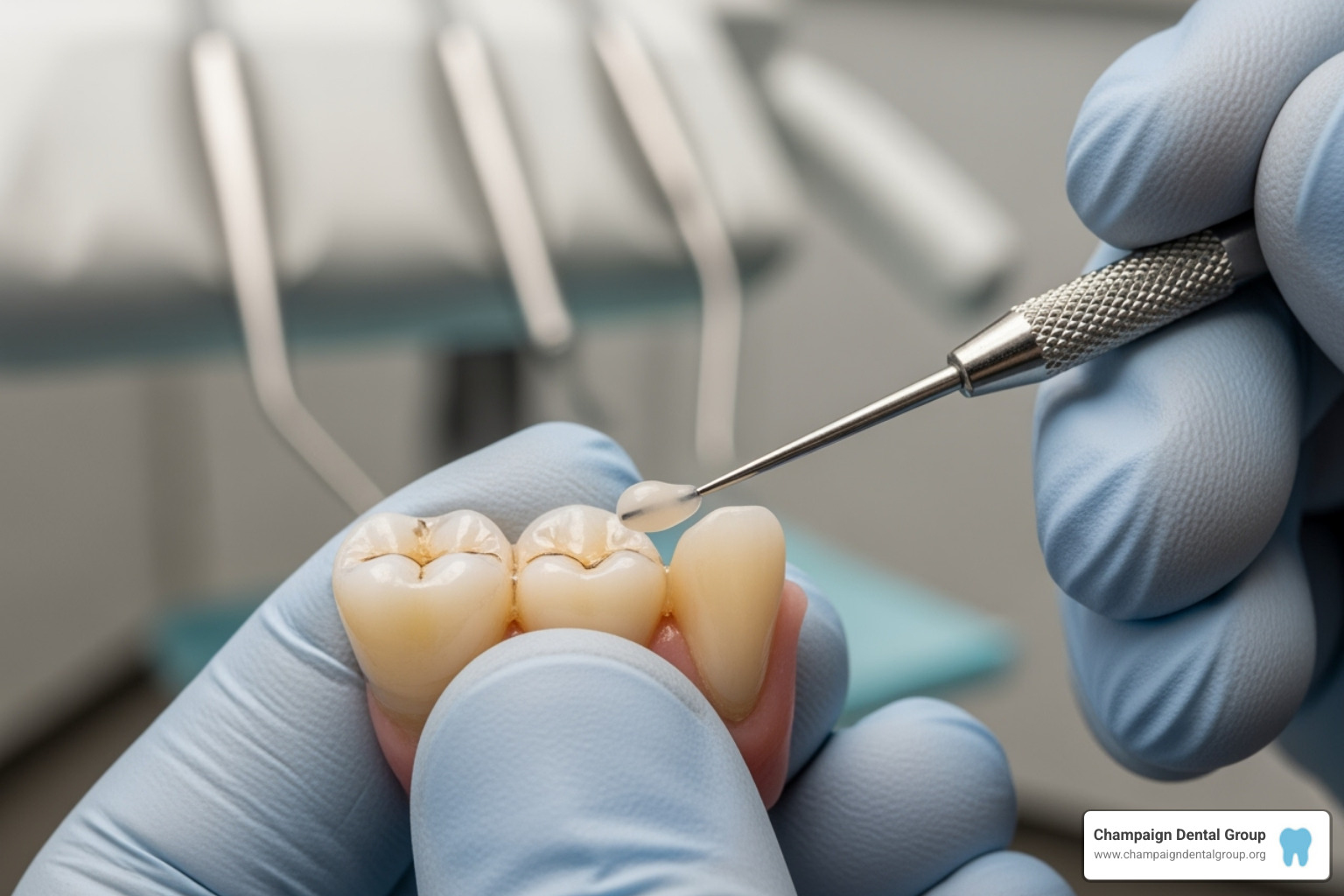
Why Tooth Surface Repair Matters for Your Family's Health
Tooth Surface Repair includes various dental procedures designed to restore damaged tooth enamel, fix chips and cracks, and protect teeth from further harm. From a chipped tooth to enamel erosion, professional repair options can save your tooth and restore your smile.
Quick Answer: Common Tooth Surface Repair Options
- Dental Bonding - For minor chips and small cracks (lasts 3-10 years)
- Dental Veneers - For cosmetic improvements on front teeth (lasts up to 30 years)
- Dental Crowns - For major damage or after root canals
- Root Canal Therapy - When damage reaches the tooth's inner pulp
- Dental Implants - When a tooth cannot be saved
That sinking feeling when you bite down on something hard and realize it's a piece of your tooth is all too common. Your tooth enamel is the hardest tissue in your body, but it isn't indestructible. Daily wear, acidic foods, teeth grinding, and accidents can all compromise its protective layer.
The good news is that modern dentistry offers excellent solutions for nearly any type of tooth surface damage. At Champaign Dental Group, our experienced team uses state-of-the-art technology to provide compassionate, high-quality care. We understand dental emergencies are stressful, and we're committed to restoring your smile quickly and effectively.
This guide covers everything you need to know about Tooth Surface Repair, from causes and treatments to prevention.
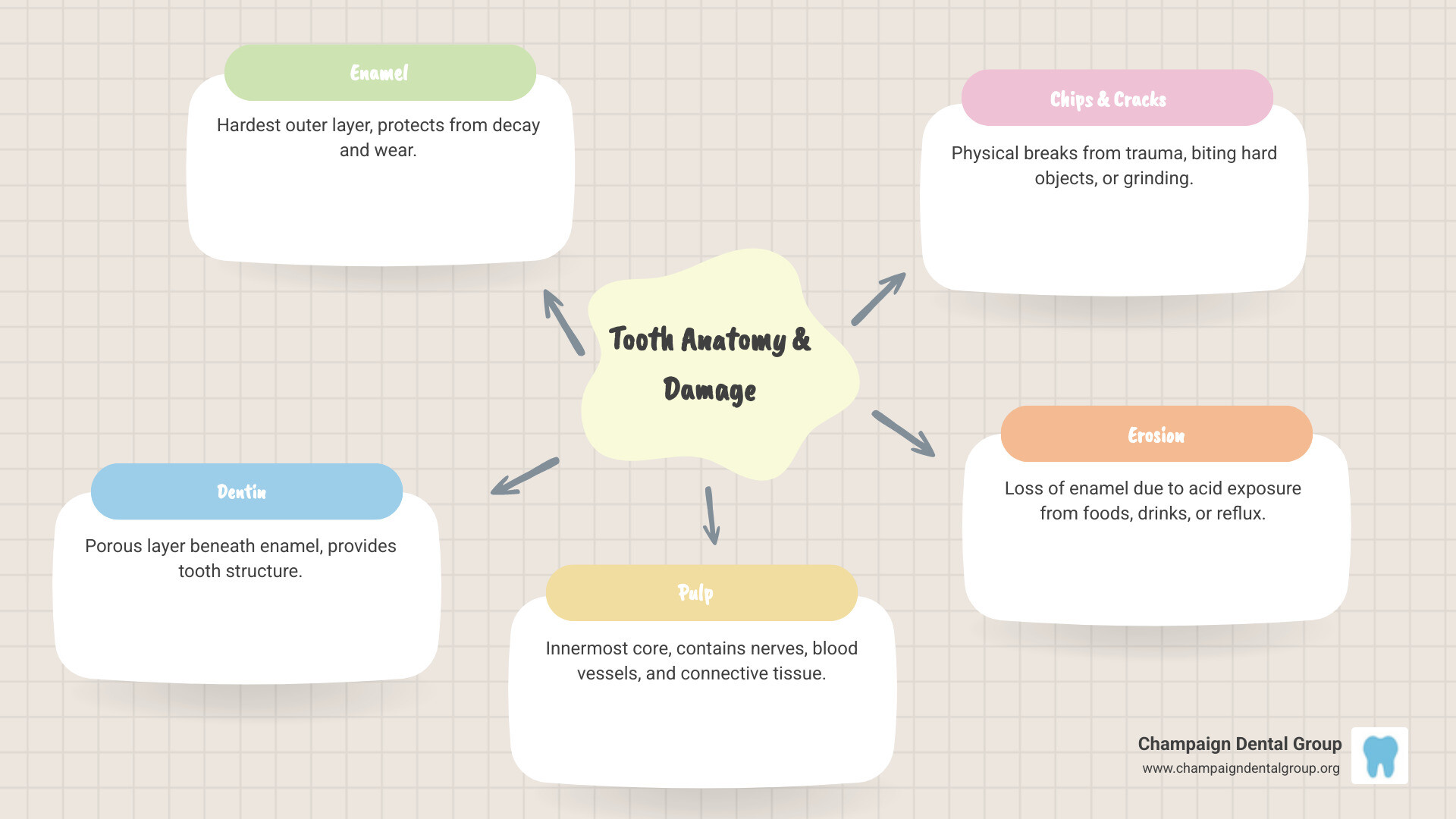
Understanding Tooth Surface Damage: Causes, Signs, and Types
Your tooth enamel is the hardest substance in your body, but it can still be damaged. Understanding the causes of Tooth Surface Repair needs can help you protect your smile.
Biting hard objects like ice or hard candy, or using teeth as tools, puts enormous pressure on enamel. The American Dental Association lists 9 foods that damage teeth, including hard candies, ice, and citrus fruits.
Accidents and trauma from sports or falls can chip a tooth in an instant, but most damage can be successfully repaired.
Tooth decay weakens the tooth structure from within, creating weak spots that can't handle normal chewing pressure.
Bruxism (teeth grinding), often occurring during sleep, puts tremendous stress on your teeth, wearing down enamel and creating tiny cracks. Jaw pain upon waking is a common sign.
Enamel erosion happens when acidic foods and drinks soften your enamel, making it vulnerable to wear. While you don't need to eliminate these foods, understanding their impact is key.
Age-related factors also play a role, as teeth naturally become more brittle over time. People over 50 are more likely to experience tooth cracks, but this doesn't mean you have to accept an imperfect smile.
Signs and Stages of Enamel Damage
Enamel damage often develops gradually, which is why regular check-ups are so important. Key signs include:
- Tooth sensitivity: A wince when eating or drinking something hot or cold can mean your enamel is thinning, exposing the sensitive dentin underneath.
- Discoloration or yellowing: As enamel thins, the naturally yellow dentin becomes more visible.
- Transparency at edges: The biting edges of your front teeth may look glassy or see-through.
- Surface indentations: Also called cupping, these small dips on chewing surfaces are a clear sign of acid erosion.
- Increased chips and cracks: Weakened enamel is more susceptible to chipping from foods that previously caused no issue.
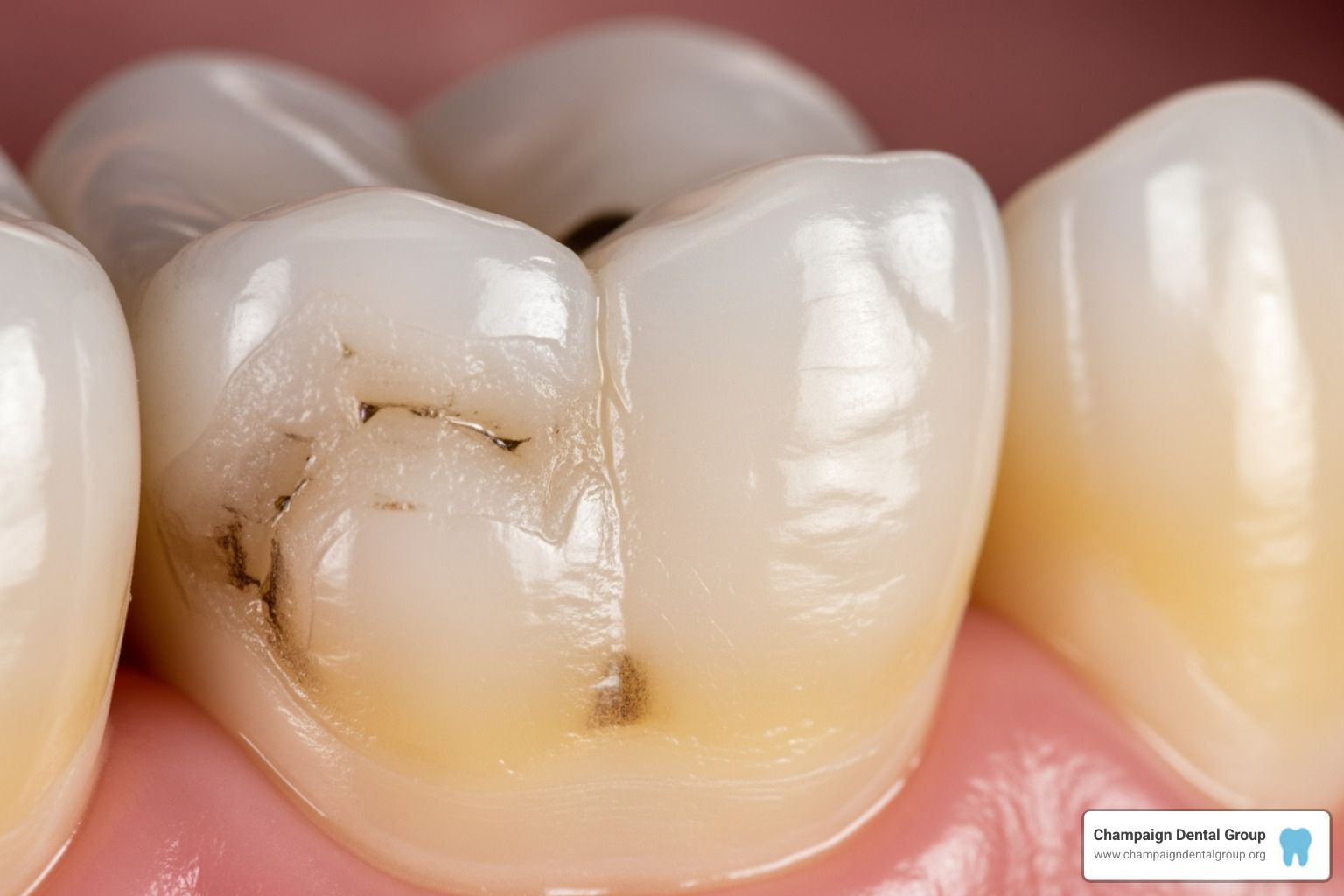
The Different Types of Tooth Cracks
Not all cracks require the same Tooth Surface Repair. Understanding the type helps determine the treatment. The American Association of Endodontists provides details on the different types of cracked teeth and their severity.
- Craze lines: Tiny, superficial cracks in the outer enamel. They are primarily a cosmetic concern and very common in adults.
- Fractured cusp: A piece of the tooth's chewing surface breaks off, usually around a filling. It typically doesn't affect the tooth's inner nerve.
- Cracked tooth: A crack that runs vertically from the chewing surface toward the root. If untreated, it can spread and lead to tooth loss. Early treatment is crucial.
- Split tooth: The result of an untreated cracked tooth, where the tooth has separated into distinct pieces. A split tooth usually cannot be saved whole.
- Vertical root fractures: These cracks start in the root and extend toward the chewing surface. They often show no symptoms until the surrounding gum and bone become infected and may require extraction.
Prompt evaluation by our caring team at Champaign Dental Group is vital if you suspect a crack.
What to Do Immediately If You Chip or Break a Tooth
Realizing you've chipped a tooth can be alarming, but knowing the right first aid steps can make a significant difference in your Tooth Surface Repair outcome.
- Rinse with warm salt water. Mix half a teaspoon of salt in a cup of warm water and swish gently to clean the area and reduce bacteria.
- Apply a cold compress. If you have swelling, apply an ice pack or bag of frozen peas wrapped in a towel to the outside of your cheek for 15-20 minutes at a time.
- Save the broken piece. If you can find the fragment, rinse it gently and store it in a small container with milk or your own saliva. Our skilled team can sometimes reattach it.
- Protect your mouth. Use dental wax (available at most pharmacies) or a piece of sugarless gum to cover any sharp edges that could irritate your tongue or cheek.
- Manage pain. Over-the-counter pain relievers like ibuprofen can help manage discomfort and reduce inflammation.
- Eat soft foods. Stick to foods like yogurt, soup, and scrambled eggs, and avoid chewing on the damaged side of your mouth.
Most importantly, contact our caring team at Champaign Dental Group right away. Even a painless chip can expose inner tooth layers to bacteria, leading to infection or more extensive damage. We understand dental emergencies are stressful and are committed to providing compassionate care when you need it most.
Time is critical if a permanent tooth is knocked out. The highest success rate for reimplantation occurs within 30 minutes. If this happens, try to gently place the tooth back in its socket. If you can't, keep it moist in milk or between your cheek and gum and get to our office immediately.
Professional Tooth Surface Repair: Your Treatment Options
Getting the right diagnosis is the first step to effective repair. At Champaign Dental Group, our experienced team has been caring for families since 1997, and we know every smile is unique.
Our diagnostic process includes a thorough visual examination, biting tests to pinpoint pain from tricky cracks, and dental X-rays to see the tooth's internal structure and reveal hidden damage. We can't stress this enough: professional treatment is absolutely essential. DIY fixes or ignoring a problem can lead to infection, the need for a root canal, or even tooth loss.
The good news is that we offer a comprehensive range of services for any Tooth Surface Repair need. Our state-of-the-art technology and compassionate approach ensure you're in excellent hands. More info about our cosmetic dentistry services.
Dental Bonding: A Quick and Effective Fix
For minor chips, small cracks, or gaps, dental bonding is a versatile and popular option, often completed in a single visit.
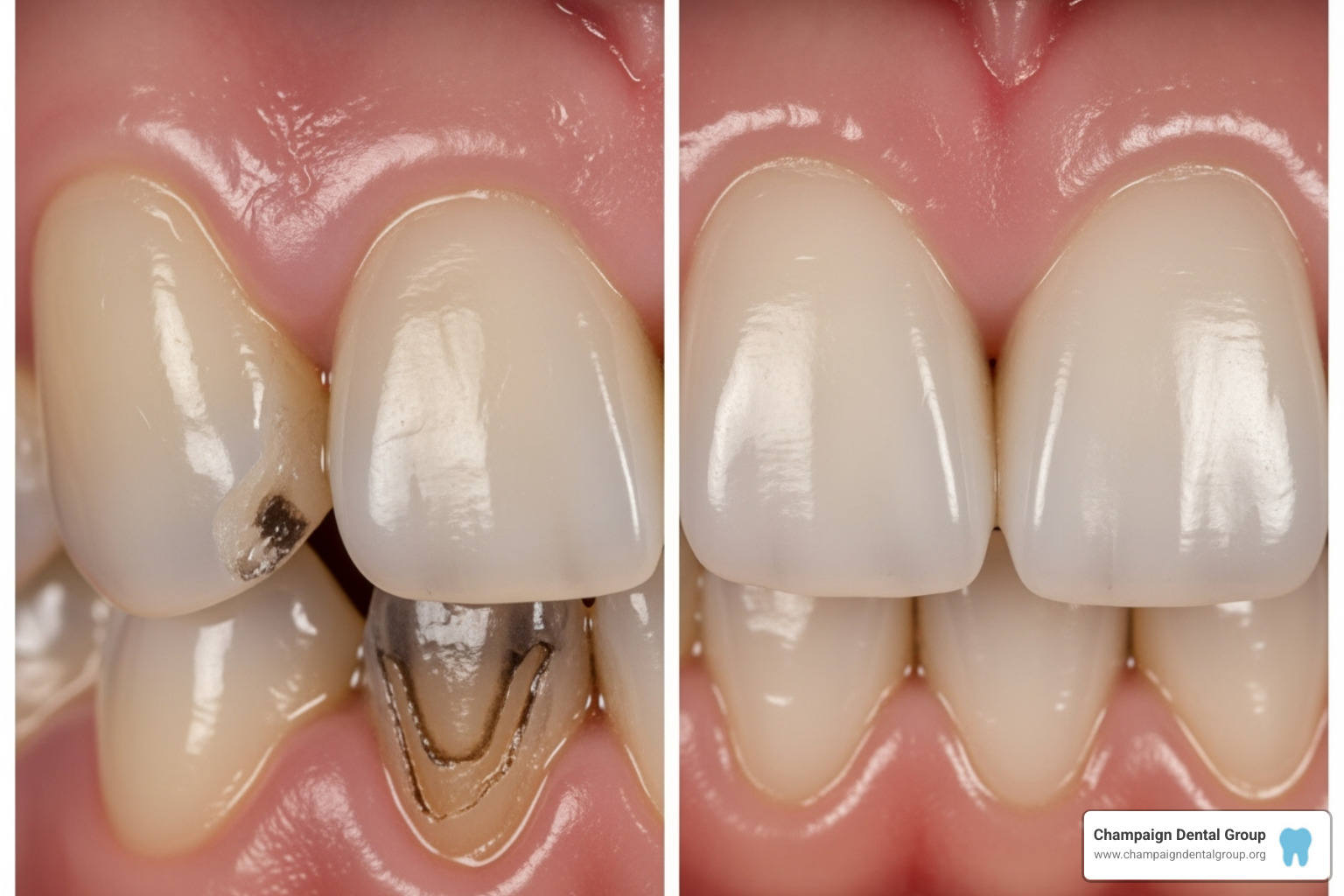
We use a tooth-colored composite resin that we can match perfectly to your natural tooth shade. Bonding is ideal for minor chips or cracks, small gaps, changing tooth shape, or protecting exposed roots. The process is straightforward: we prepare the tooth, apply and sculpt the resin, harden it with a special light, and polish it for a seamless blend. Dental bonding typically lasts 3 to 10 years with proper care, and recovery is minimal. More info about our Bonding services.
Dental Veneers and Crowns: For More Significant Repairs
When damage is more extensive, we often recommend dental veneers or crowns.
| Feature | Dental Veneers | Dental Crowns |
|---|---|---|
| Best for | Cosmetic improvements, minor chips, shape correction | Large fractures, severe decay, post-root canal protection |
| Material | Thin porcelain or composite shells | Porcelain, ceramic, metal, or combination |
| Coverage | Front surface only | Entire visible tooth |
| Longevity | Up to 30 years (porcelain) | 5-15 years depending on material |
| Visits needed | Usually 2 visits | 2 visits (sometimes same-day with CEREC) |
| Strength | Very strong and stain-resistant | Restores full biting force |
Veneers are thin, custom-made shells that cover the front of your teeth, perfect for addressing severe discoloration, minor chips, or uneven shapes. Porcelain veneers offer exceptionally natural-looking and durable results.
Crowns are about restoring structural integrity. A crown covers the entire visible portion of a tooth, providing a new, strong surface. We recommend them for large fractures, extensive decay, or to protect a tooth after a root canal. Using advanced CEREC technology, we can often create and place beautiful, color-matched porcelain crowns in a single visit. More info about our Veneers vs Crowns options.
Advanced Tooth Surface Repair: Root Canals and Implants
When damage reaches the tooth's inner pulp, more advanced treatments are needed.
Root canal therapy is necessary when the soft inner pulp becomes infected or inflamed. This procedure relieves pain by removing the damaged pulp, cleaning the tooth's interior, and sealing it. Afterward, we typically place a crown to protect the tooth and restore its full strength. Modern root canals are often as comfortable as getting a filling.
When a tooth is too damaged to be saved (e.g., a crack extends below the gum line), extraction may be the best option for your overall oral health. In these cases, dental implants offer an excellent solution. As explained by the American Academy of Implant Dentistry, when a dental implant is the best option, it often involves non-treatable cracks.
A dental implant is a small titanium post that acts as a new tooth root. It is placed in the jawbone, where it fuses to create a stable foundation. We then attach a custom crown, resulting in a replacement tooth that looks, feels, and functions naturally and can last a lifetime. Our compassionate team has extensive experience with implant procedures, helping patients regain their confidence and smile.
Prevention and Long-Term Care for a Healthy Smile
While we offer state-of-the-art Tooth Surface Repair options at Champaign Dental Group, prevention is always the best approach. A little regular care can help you avoid major repairs.
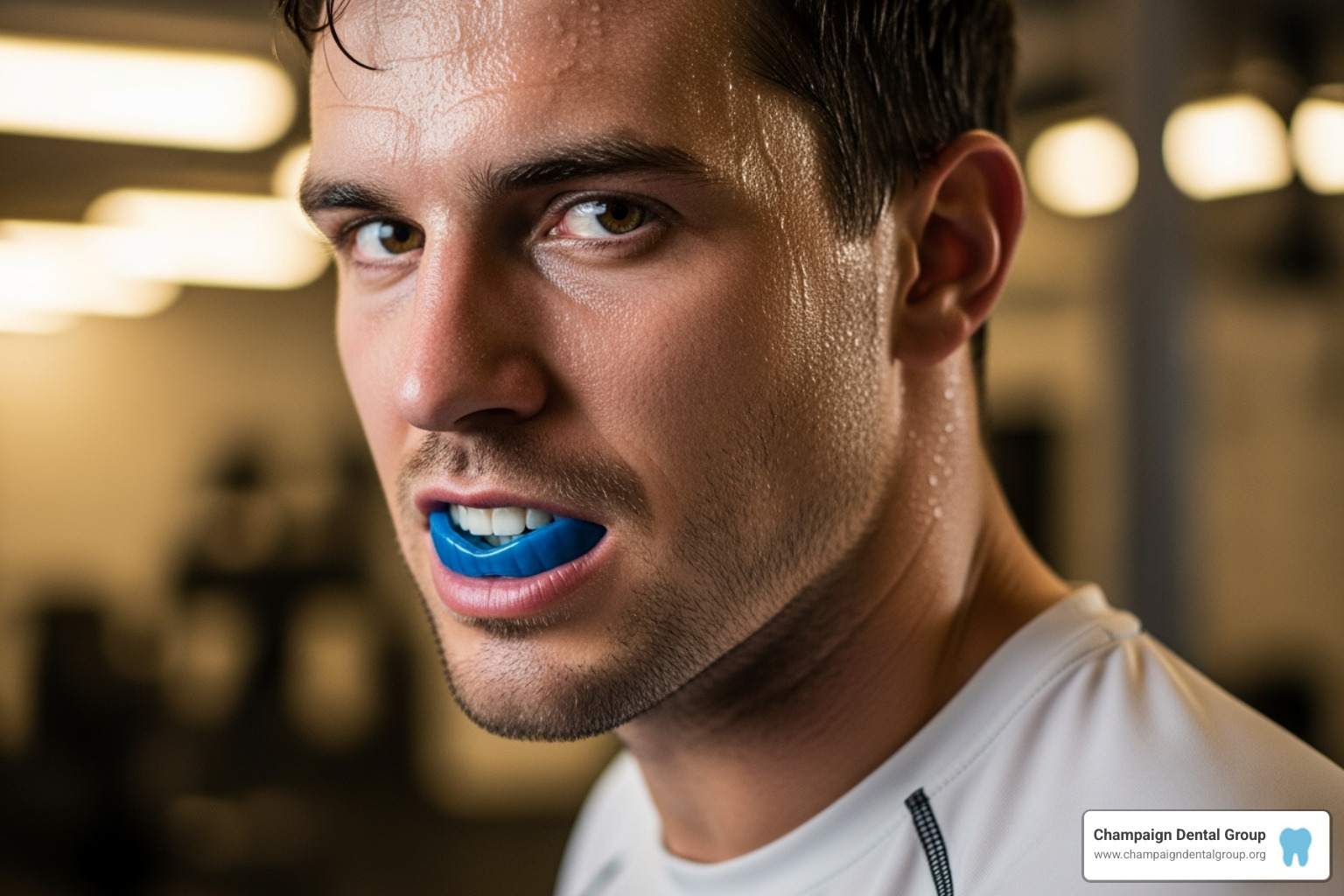
Prevent Enamel Erosion: Be mindful of what you eat and drink. Limit acidic foods like sodas and citrus fruits, and when you do indulge, drink them through a straw. Use a soft-bristled toothbrush with gentle, circular motions and fluoride toothpaste to strengthen enamel. Stay hydrated with water to wash away acids and food particles.
Prevent Chips and Cracks: Don't use your teeth as tools to open packages. Avoid chewing hard things like ice, popcorn kernels, and hard candy. The Cleveland Clinic specifically warns that chewing on ice can cause serious tooth damage.
Use Protective Guards: If you or your family play sports, wearing a custom-fitted mouthguard is essential. For those who grind their teeth at night (bruxism), a custom nightguard protects your teeth from the powerful forces generated during sleep.
The importance of regular dental check-ups cannot be overstated. Our experienced team at Champaign Dental Group can spot early warning signs you might miss. Since 1997, we've used state-of-the-art technology to catch small problems before they become major Tooth Surface Repair needs. During your visit, our compassionate team provides professional cleanings and a personalized prevention plan. Preventing damage is always easier and less expensive than repairing it.
Frequently Asked Questions about Tooth Surface Repair
Over our years of serving the Champaign community since 1997, we've answered many thoughtful questions about Tooth Surface Repair. Here are some of the most common ones.
Can a cracked tooth heal on its own?
Unfortunately, a cracked tooth cannot heal on its own. Unlike bone, tooth enamel lacks the living cells needed to regenerate. A crack will remain and can worsen over time without professional intervention. The importance of treatment is to prevent further damage and infection. What starts as a small crack can lead to severe pain or even tooth loss. Early care from our experienced team provides the most options to save your natural tooth.
Is tooth surface repair painful?
Concerns about pain are natural, but most Tooth Surface Repair procedures are comfortable. Many treatments are minimally invasive, like dental bonding, which often requires no anesthesia. For more involved procedures, we use effective local anesthesia to completely numb the area. Our compassionate care approach means we prioritize your comfort. Any mild, temporary sensitivity after a procedure is typically manageable with over-the-counter pain relievers.
How much does tooth repair cost?
The cost varies significantly by treatment, from a simple bonding procedure to a dental implant. Insurance coverage often helps with medically necessary restorative treatments. Our team is transparent about costs and will help you understand and maximize your benefits. We accept most major insurance plans, and you can find more details here: more info about insurance and bonding. For affordable options, we also offer the Champaign Dental's Smile Protection Plan for families without dental insurance. We will always work with you to find a solution that fits your health needs and your budget.
Conclusion: Restore Your Smile with Confidence
When tooth damage strikes, it can affect your confidence and daily life. Fortunately, modern Tooth Surface Repair offers effective solutions for nearly any issue, from minor chips fixed with bonding to major damage requiring crowns or implants.
The key takeaway is that prevention is the best medicine. Protecting your teeth and maintaining excellent oral hygiene can help you avoid many problems. But when damage does occur, prompt professional care is crucial for preserving your natural teeth.
At Champaign Dental Group, our experienced team has been committed to providing high-quality patient care to families in Champaign and Urbana since 1997. We combine state-of-the-art technology with genuine compassion, ensuring every patient receives personalized treatment in a comfortable, welcoming environment. Our goal is to build lasting relationships and help you maintain optimal oral health for life.
Don't wait to address a damaged tooth. A minor issue today can become a serious problem tomorrow. The sooner you seek treatment, the more options we have to restore your smile to its full potential.
Ready to take the next step? Explore our Restorative Dentistry services today! and find how we can help you achieve the healthy, confident smile you deserve.
.jpg)